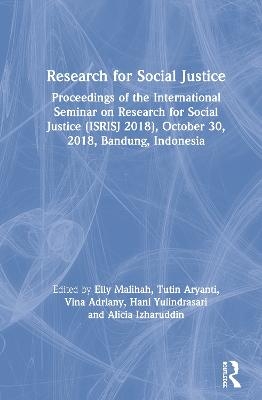
Research for Social Justice
Routledge (Verlag)
978-1-138-36974-0 (ISBN)
Individuals are equipped with a wide range of knowledge that enhances their employability, health, family life, and social engagement. On this basis, providing equality for all has been set to be achieved as one of the United Nations sustainable development priorities. However, the international understandings are not only of what equality and inclusivity entail but also the social vision to achieve social justice. Best practices provide a meaningful cross-national discussion with respect to the following topics: power relations within research, social inequalities in society, science research for social justice, the redefinition of the notion of social justice, education for social justice, spatial justice, the research of gender and marginalized groups, the re-conceptualization of the epistemological foundation of research, hegemonic discourses on research, science technology for social justice and welfare, as well as culture and social justice.
This edited book aims to provide a new perspective for other benefits of research because generally, the research carried out only aims to answer scientific problems and often override aspects of humanities. In response to these concerns, the book attempts to re-map the main objectives of the research. The authors in this book offer new perspectives, especially in formulating the purposes of the studies they will perform. Therefore, this book presents a unique review of research with a variety of approaches that are coherent with the state of society in the world, followed by eleven scopes of various cases from a variety of perspectives that highlight theoretical and methodological questions about research and social justice. This book presents outstanding applications through multiple types of approaches that are relevant to the current context of world community issues. The articles in this book will be of interest to undergraduate and graduate students, as well as researchers who are interested in the social field, especially research for social justice.
Elly Malihah is professor of sociology at Universitas Pendidikan Indonesia. She received her doctoral degree from Padjadjaran University, Indonesia. She works on gender studies and is currectly chairing the Center of Gender and Children Studies at Universitas Pendidikan Indonesia. Vina Adriany is associate professor of early childhood education at the Department of Early Childhood Education, Universitas Pendidikan Indonesia. She received her PhD from the Department of Educational Research, Lancaster University, UK. Her research focuses on the issues of gender in early childhood education and social justice in early childhood education. She has published a number of peer reviewed articles and book chapters on the topic. She has also been invited as visiting lecturer in Sutan Qaboos University, Oman and Gothenburg University, Sweden. Tutin Aryanti is associate professor of architecture and gender and women’s studies at Universitas Pendidikan Indonesia. Her course of research revolves around spatial justice, gender issues in architecture, Islamic architecture, and ethnography. Her dissertation on gender and power in contemporary Indonesian mosque architecture was awarded the Best Dissertation in Social Sciences by the International Convention of Asia Scholars in 2015. Hani Yulindrasari is senior lecturer in the Faculty of Education, Universitas Pendidikan Indonesia. She received her master’s and doctoral degrees in gender and Asian-related studies from the University of Melbourne. Her research interest is the psychology of gender and gender in education. Alicia Izharuddin is senior lecturer in Gender Studies at the Faculty of the Arts and Social Sciences, University of Malaya, in Malaysia. She received her PhD in Gender Studies from the School of Oriental and African Studies, University of London, UK, in 2014. Her research focuses on gender and sexuality in Malaysia and Indonesia from a feminist perspective.
1. Culture and Social Justice; 2. Education for Social Justice; 3. Hegemonic Discourse on Research; 4. Power Relation within Research; 5. Re-Conceptualization the Epistemological Foundation of Research; 6. Redefining the Notion of Social Justice; 7. Researching Gender and Marginalized Group; 8. Science Research for Sor Social Justice; 9. Science Technology for Social Justice and Welfare; 10. Social Inequalities in Society; 11. Spatial Justice.
| Erscheinungsdatum | 23.08.2019 |
|---|---|
| Verlagsort | London |
| Sprache | englisch |
| Maße | 174 x 246 mm |
| Gewicht | 703 g |
| Themenwelt | Sozialwissenschaften ► Politik / Verwaltung ► Politische Theorie |
| Sozialwissenschaften ► Soziologie ► Allgemeines / Lexika | |
| Sozialwissenschaften ► Soziologie ► Makrosoziologie | |
| ISBN-10 | 1-138-36974-8 / 1138369748 |
| ISBN-13 | 978-1-138-36974-0 / 9781138369740 |
| Zustand | Neuware |
| Informationen gemäß Produktsicherheitsverordnung (GPSR) | |
| Haben Sie eine Frage zum Produkt? |
aus dem Bereich


